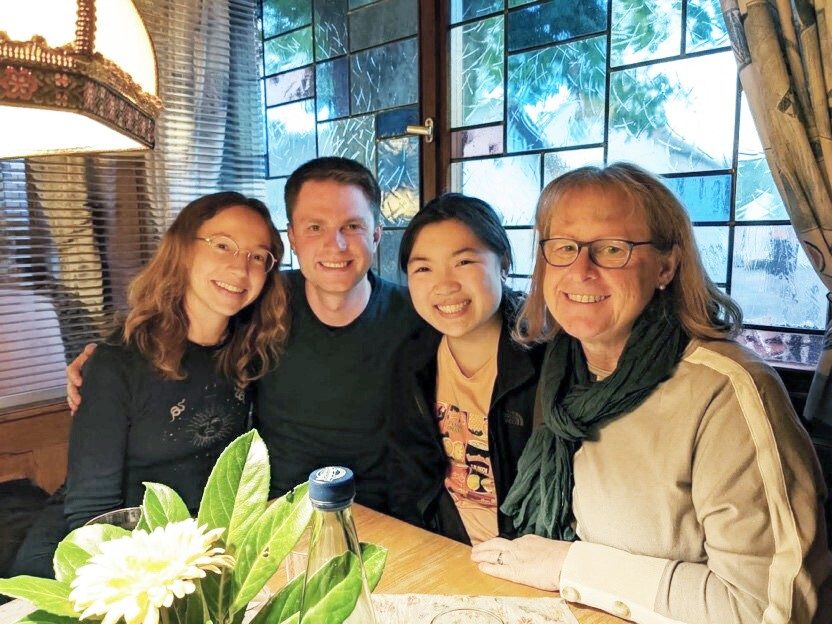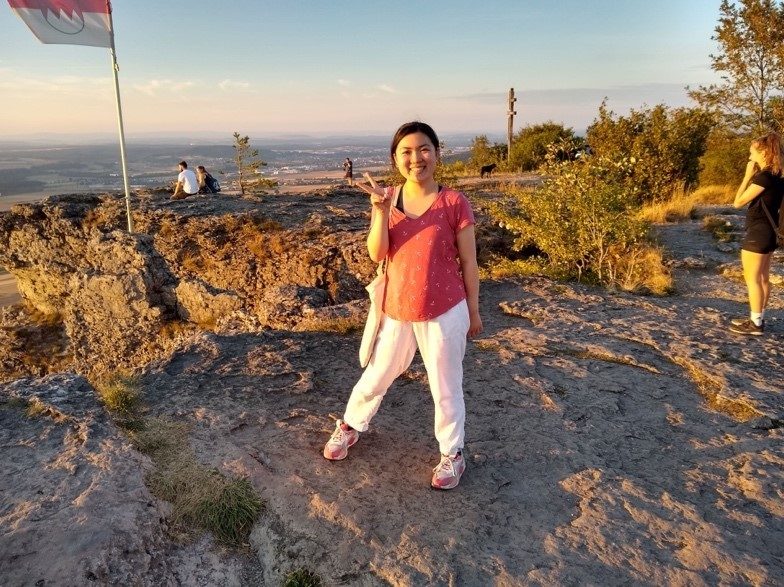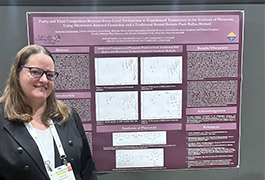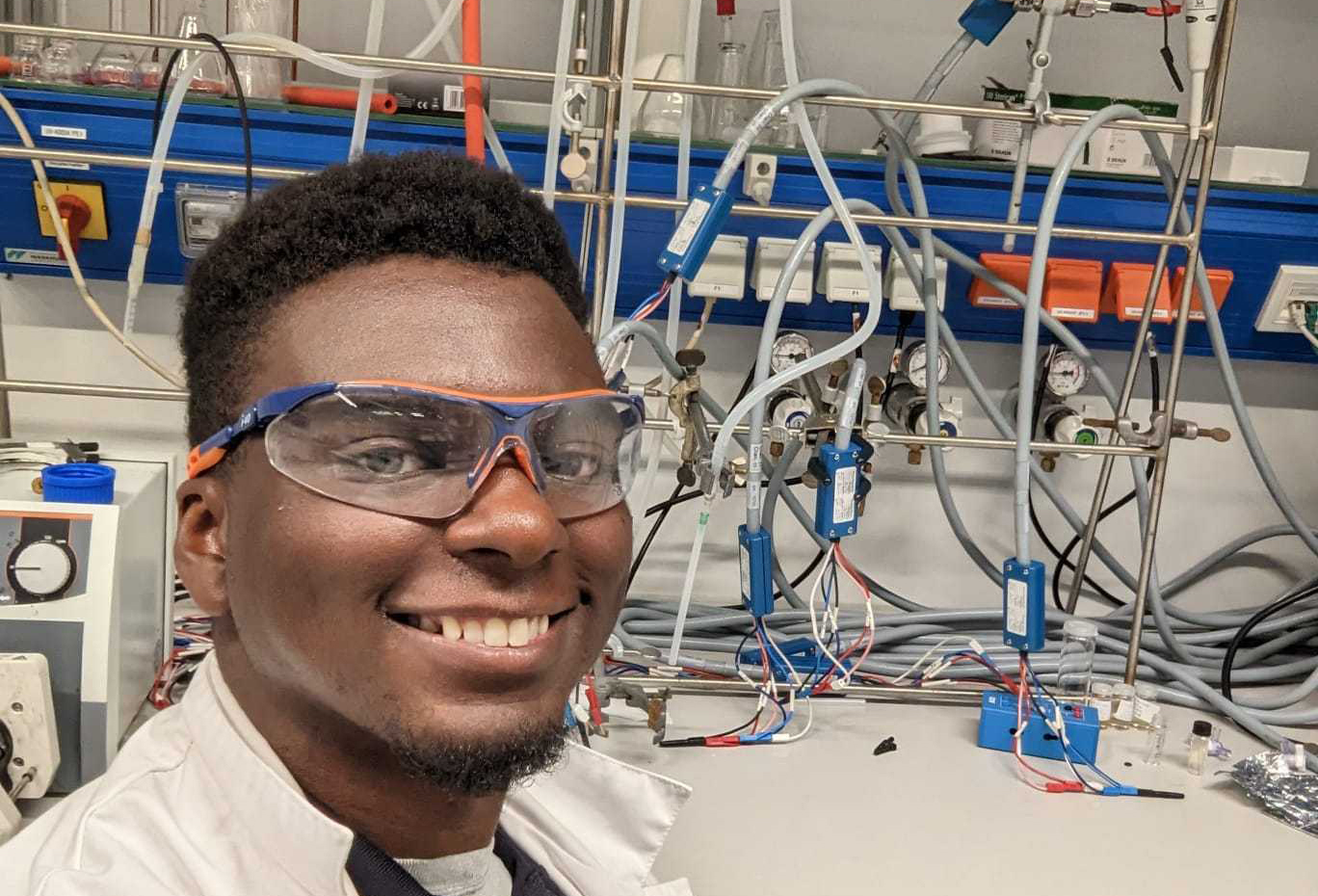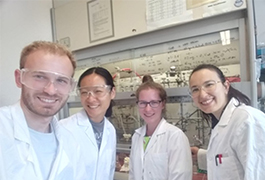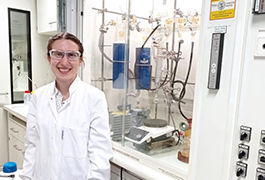U.S. Students Share Their Summer Research Experiences in Germany and Singapore
Have you ever thought about doing research in another country or experiencing a new culture? Eleven students in the ACS International Research Experience for Students (IRES) program had the privilege of doing just that during their summer break in 2022. IRES participants spend 10–12 weeks doing paid research in either Germany or Singapore to develop research skills, get exposed to different cultures, and make new connections.
Here's what some of the 2022 IRES cohort had to say about their unforgettable experiences.
Peeking into the industry process
Name: | Katie Chism |
Projected graduation date: | Spring 2023 |
Home institution: | Colorado State University |
Host institution: | Fraunhofer Institute for Manufacturing Technology and Advanced Materials, IFAM Bremen |
Research focus: | Develop a Schiff base polymer to adhere bone fragments after surgery as an alternative to current metal plates and screws |
Working in my research group in Germany was really different from my group at Colorado State University. Prior to traveling to Germany, I was doing small-scale experiments in a purely research environment. At IFAM, however, decisions were heavily influenced by budget and industrial applications. I worked on scaling up reactions, and my mentor and I had to consider how easily the product could be used by a medical professional. It was a completely new experience to consider how expensive and practical starting materials would be for reactions run in large batches. I work with 20 mL scintillation vials at my university in the US, but in Germany I was using 1 L flasks and 60 g of starting material, which was intimidating at first.
We weren’t just trying to see if something was possible; we were trying to see if it was also practical and marketable. These layers to the scientific process helped me understand the interface between research and industry. If projects worked but had no target market or were too complicated for the intended user, then they were not continued. In my project specifically, we had to be mindful that doctors and not research scientists would be using this product in a surgical setting. That dictated a lot about how complex, demanding, and sterile our product and application method would have to be. It was really cool to see how research translates to industry and how an industry- focused research group prioritizes projects.
My group also regularly enjoyed afternoon cake breaks, which were also amazing, and it’s something I’ll be trying to bring back to my home lab.
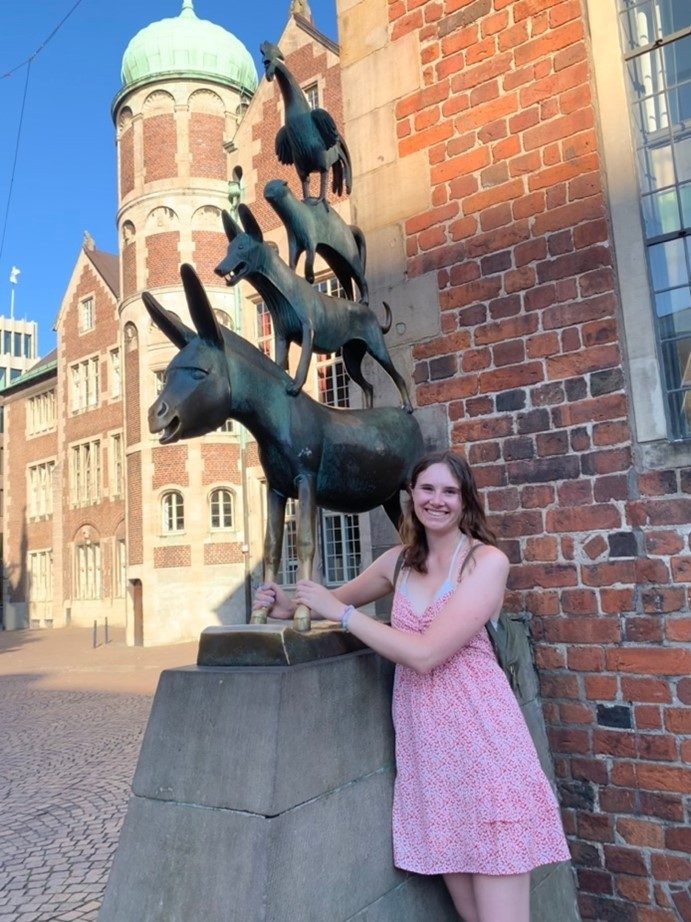
Developing vocabulary and perspective
Name: | Adam Klinger |
Projected graduation date: | May 2023 |
Home institution: | Syracuse University |
Host institution: | Technical University of Freiberg |
Research focus: | Influence of Al binders on the stability of Fe catalysts used for CO₂ methanation |
The most memorable part of my research experience was the amount of independence I was afforded. The first couple of weeks consisted of extensive training, but afterward my adviser allowed me to synthesize, prepare, and test catalysts completely on my own as well as chart out the data analysis without assistance. The level of independence was significantly different from the research I’ve done in the US, which often required permission or assistance from fellow research associates and advisers.
Although I worked largely on my own, I thoroughly enjoyed interacting with others in the research group. They were always willing to help and had extensive knowledge not only about their research topic but also the research of others in the group, and that strengthened the group dynamic. One thing I appreciated was the opportunity to practice my German on a daily basis with others in the lab. I was able to improve my conversational German and learn technical vocabulary necessary for equipment and processes.
Another thing I really appreciated about my experience was gaining a better understanding of work–life balance. Germans do a great job of separating work time from the rest of their life, most notably on Sundays when everything is closed! They also have their own word for the evening after a workday: “Feierabend.” It literally translates to “celebration” or “party evening.” Since returning home, I’ve tried to incorporate this same mentality into my daily life, and it’s helped significantly with my mental health and productivity.
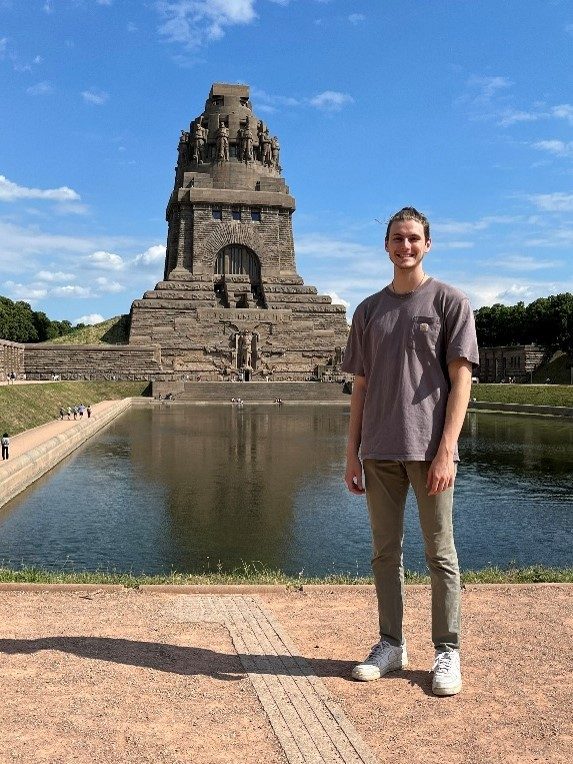
Discovering a new country via food
Name: | Adam Parris |
Projected graduation date: | May 2023 |
Home institution: | University of South Carolina |
Host institution: | National University of Singapore |
Research focus: | Use of nickel catalysts to install aryl groups onto difluorinated NSAIDs [Non-Steroidal Anti-Inflammatory Drugs] |
Before going to Singapore, I had heard that the country was famous for its food. I have always considered myself an adventurous eater, so I expected to enjoy eating something new. Even though I knew about rave reviews of the food scene, I was still shocked by the wide range of foods, flavors, and dining experiences.
The most memorable food that I ate was perhaps the infamous durian. Not sure if we were willing to spend $10 on the fruit, one of the “uncles” at the durian stall gave me and my friends a sample. The texture was smooth yet stringy, the flesh was soft, and the flavor was reminiscent of garlic, fish, and florals. I really didn’t like it, but I discovered other foods that I loved.
We ate ice cream sandwiches that were served on a slice of white bread instead of chocolate wafers. I sampled Michelin star tasting menus that dazzled my peanut butter and jelly prone–pallet. I really enjoyed century eggs. They are sweet and creamy and just a bit tangy, not nearly worthy of the disgust they invoke on shows like Fear Factor. Most importantly, I enjoyed my senses and appreciated the novel in ways that I hadn't before. I began to view food as an art form and a window into the experiences and stories of people I hadn’t known before.
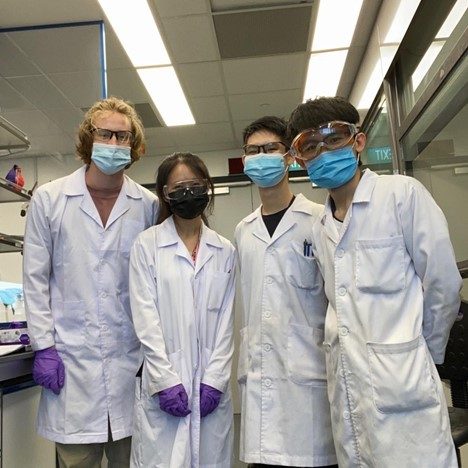
Overcoming a language gap
Name: | Carolyn Glasser |
Projected graduation date: | May 2023 |
Home institution: | University of Michigan, Ann Arbor |
Host institution: | Heinrich Heine University Düsseldorf |
Research focus: | Synthesizing siderophore–antibiotic conjugates to improve the accumulation and whole-cell activity of an IspC inhibitor developed in the lab |
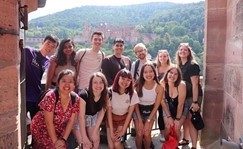
I remember stepping off the plane in Germany. I was excited and nervous about being in a new country, and I was immediately met with culture shock that came with not speaking the native language. The people in my host lab were some of the most welcoming, considerate, and generous people I have ever met, and they were one of the biggest reasons that this summer turned out to be one of the best summers of my life. They were interested in hearing about my life in America, and I really enjoyed getting to know more about them and about Germany as the summer went on. Everyone in my lab was very helpful. They always answered my questions and showed me new techniques in organic chemistry. I also got to enjoy lab barbeques after work, where I got a taste of the local German cuisine and learned essential German phrases.
Aside from the wonderful work environment, I enjoyed the opportunity to travel with other interns during the summer. Düsseldorf is located on the west side of Germany, making it easy to travel to nearby countries like Belgium and the Netherlands. I met new interns every week and experienced different cultures and cuisines.
I had a great experience in Germany, and I am looking forward to going back soon.
Developing independence both inside and outside the lab
Name: | Kara Moulton |
Projected graduation date: | May 2023 |
Home institution: | Saint Joseph's University |
Host institution: | University of Münster |
Research focus: | Synthesizing novel P2X4 receptor antagonists |
The first thing I learned from my experience in Germany was to make sure you eat breakfast and recover from jet lag before starting a new job in order to avoid passing out in the office of a professor you are meeting for the first time. I will say my experience improved after that! I admit it was stressful working in the lab at first, having to learn new instruments and techniques and trying my hardest not to mess up. But with the help of the others in the lab and their patience in answering my many, many questions, soon I became more comfortable and confident. As the summer progressed and I became more familiar with the project, my mentor pushed me to think independently. I was able to research and attempt new reactions, and I could even decide what derivations of my target molecule I was going to synthesize. This showed me that I will really enjoy being an independent researcher, and I cannot wait to undertake more research in graduate school.
I also learned a lot about myself as a person, beyond being a chemist. Outside of research, I loved the independence I found in Germany. I rented a bike during my stay and absolutely enjoyed the freedom of going somewhere without the need to worry about traffic, or parking, or buses running late. Without my normal cell phone data plan, I became less dependent on my phone (except for Google Maps, of course) as I learned to travel solo. It took no time for me to feel at home.
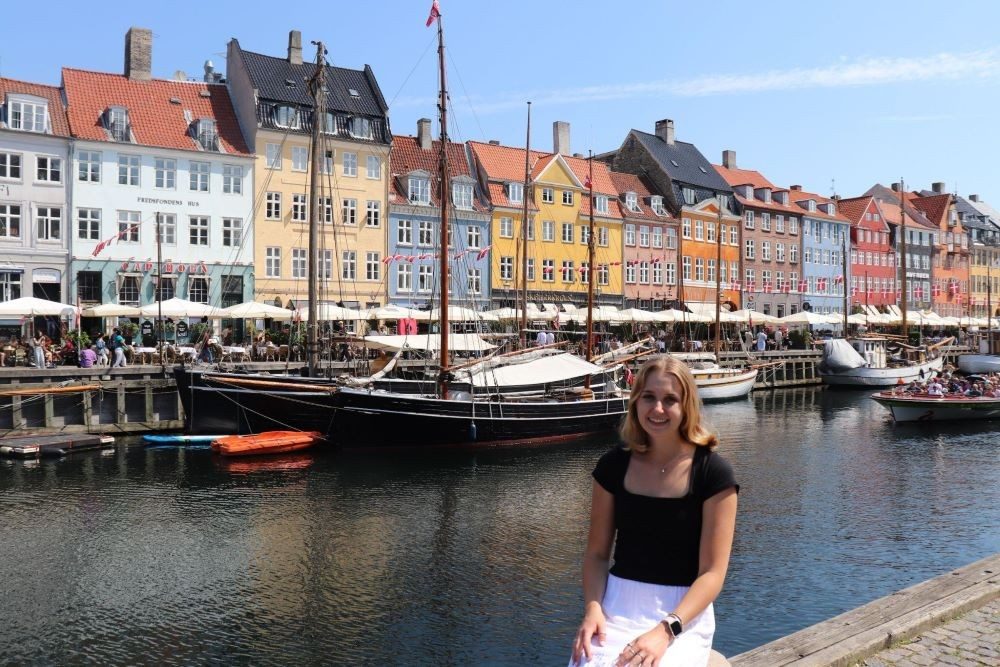
The importance of support
Name: | Stacy Villanueva |
Projected graduation date: | May 2023 |
Home institution: | University of Maryland, Baltimore County |
Host institution: | National University of Singapore |
Research focus: | Worked on a project involving ab initio evaluation of the crystal field splitting in lanthanide-based compounds, focusing on compounds with trigonal symmetry |
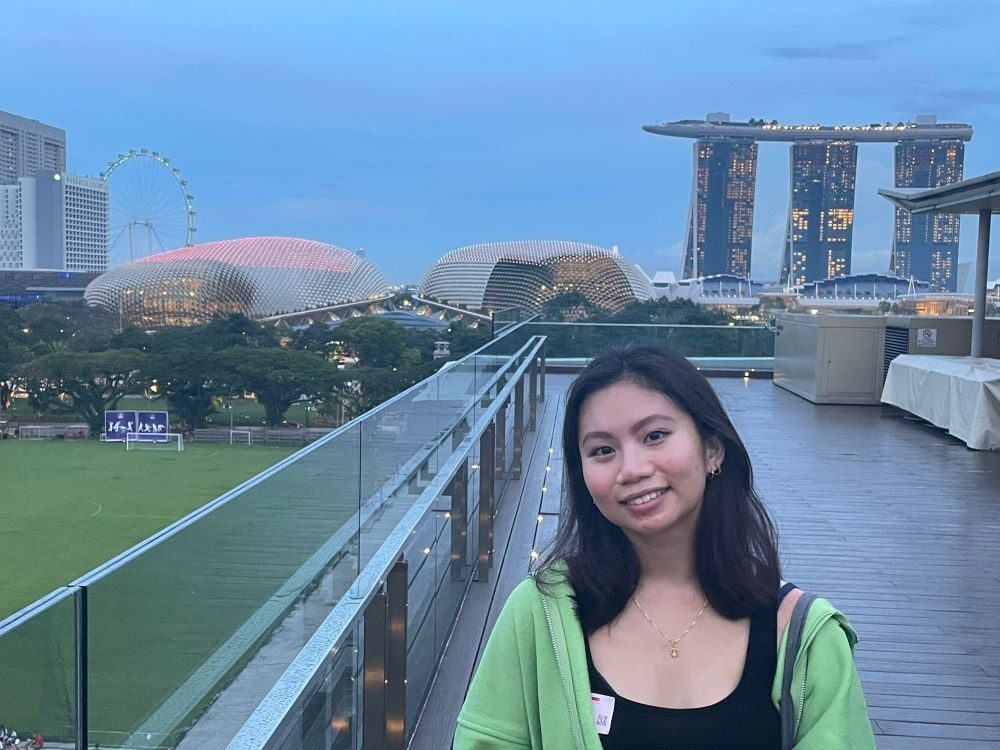
Going into college, I always knew that I wanted to study abroad. When I heard about the ACS IRES program in Singapore, I knew it would be the perfect opportunity for me. Not only was this internship experience related to my major, but I would be able to use my Chinese language minor since Mandarin is one of Singapore’s official languages. The only problem was that I had never lived so far away from home before by myself. Singapore is a 22-hour flight from home, and I would be experiencing a whole different culture for 10 weeks. I had never even flown by myself before!
My initial anxieties about living in a foreign country quickly turned into excitement and wonder about the places and opportunities I would get to experience. Having other interns from America to interact with helped make my experience positive because we were able to explore the country together. I felt confident in being independent without my parents around, and I learned that I have the willingness and desire to work abroad. If my future employer gives me the opportunity to work abroad, I know that I could go through with it and enjoy the experience.
Expanding knowledge and boundaries
Name: | Caroline Downes |
Projected graduation date: | May 2024 |
Home institution: | Michigan State University |
Host institution: | Heinrich Heine University Düsseldorf |
Research focus: | RNA–protein interaction in vivo: endosomal mRNA transport in Ustilago maydis. The focus was on understanding how the different RNA recognition motifs (RRM) of the Rrm4 protein complex influence the ability and affinity of mRNA to bind to the Rrm4 complex. |
The most memorable part of doing research in Germany was the opportunity to expand my scientific knowledge. My previous work in scientific research was an entirely different topic from what I performed in Germany. This research experience gave me the chance to learn more about mRNA transport and the work that others are doing internationally. To meet experts in this topic and learn more about their work was an unparalleled opportunity. I learned a lot about graduate school expectations, as well as the field of mRNA transport. These insights allowed me a more insider view of what laboratory research looks like.
Living in Germany for 2.5 months was something I will never forget. I took the trams through the city my first day and marveled at how green it was. I lived in Düsseldorf, a city in North Rhine-Westphalia. I thought that I would feel secluded in that part of the city but found that traveling around and getting to know the city was incredibly easy. I visited many towns near and far and used the opportunity to learn more about Germany.
Ultimately, the people with whom I interacted had the biggest impact on me. They shared stories with me and we made memories together. Each and every one of them holds a place in my heart. I hope that one day I can return and see these people again, to say hello and be reminded of my beautiful time in Germany.
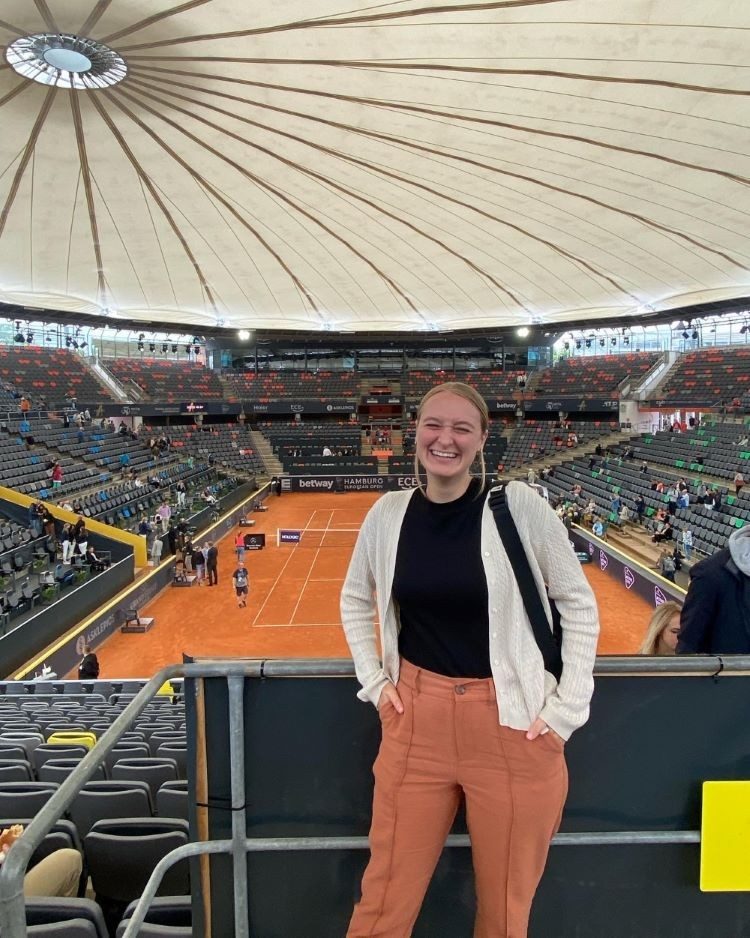
Out of struggle, discovery!
Name: | Meg Takezawa |
Projected graduation date: | June 2024 |
Home institution: | University of Washington |
Host institution: | Coburg University of Applied Sciences and Arts |
Research focus: | Free-flow electrophoresis (FFE) is a continuous separation method in which the charged analytes are injected into a channel where the electrical charge is applied orthogonal to the buffer flow. I engineered a microscale version of FFE using laser ablation–based additive manufacturing to expand its analytical applications at the host institution. |
As someone who had never independently traveled abroad, I had a mix of anxiety and fear upon arriving in Germany. My anxiety grew after realizing that the topic of my research project was unlike anything I had ever learned before. Despite the obvious language barrier, I decided to look for new and exciting things every day.
As I achieved every weekly milestone at my host institution, I started to appreciate the beauty of studying new subjects and expanding my knowledge beyond my comfort zone. The learning curve was immense, but I was passionate to learn more. I started to ask more questions and continued to broaden my interest in the field of chemistry.
My discoveries expanded beyond research. My landlady introduced me to her neighbors, who invited me to bratwurst BBQ parties, short hiking trips, and Sunday breakfasts. I actively listened to their conversations by recognizing certain words or phrases while learning simple vocabulary to express my thoughts. Some of my favorite discoveries were the incredible food culture in Germany, ranging from Currywurst (curry sausage) and Sauerbraten (marinated roast) in Berlin to “die Bamberger Zwiebeln” (the Bamberg Stuffed Onions)! By the end of my summer, I had built so many valuable networks and memories that I will cherish forever.
I wish I had known earlier that it is normal to struggle because at the end of the day, what matters is embracing challenges and encouraging yourself to grow. Learning is difficult, but that’s what makes it so exciting. And I’m happy I got to experience that in Germany.
